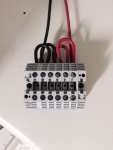DeepC, I would use separate switches AND individual fuses/circuit breakers for each circuit. Otherwise if one feed shorts out, you loose everything. So separate all the different circuits, and install fuses/breakers and switches. Then you have total control over everything. I realize you have a fuse at the main run at the battery (or I hope so), but you also need fuses/breakers at the break out junctions as well. So before rewiring everything. Draw up a plan and post it back on here for us to see. If it looks correct and safe, we will tell you so. JMHO!
And one issue I would like to say. But mine you , this is just MY opinion. Some talk about fusing to the limit of the wiring run. But I disagree with that assumption and here is why. If I run 12 gauge wire, and I read that 12 gauge wire can handle 15 amps for a 10 foot run. I don't use a 15 amp fuse or breaker in that circuit. I use a 10 or 12 amp fuse instead. Because yes it can handle 15 amps when everything is fresh and all the connections are bright and shiny and new. But over time degradation takes hold and now 15 amps may cause the wires to heat up. And the worst it gets the hotter the wire gets. So in time it could start a fire if 15 amps were drawn across it now. So I usually fuse for a little over what I will draw on that wire. So add up what you will use on that circuit and then figure in just a little over that and fuse for that amount. I doesn't matter if the wire can handle more or not. It is a safety factor. Example, if your depth locator uses 4 amps max, I would use a 5 amp fuse, not a 15 amp fuse. Bu that is just my opinion. Not everybody likes that idea. So whatever you do, just don't exceed the wire capability.




















